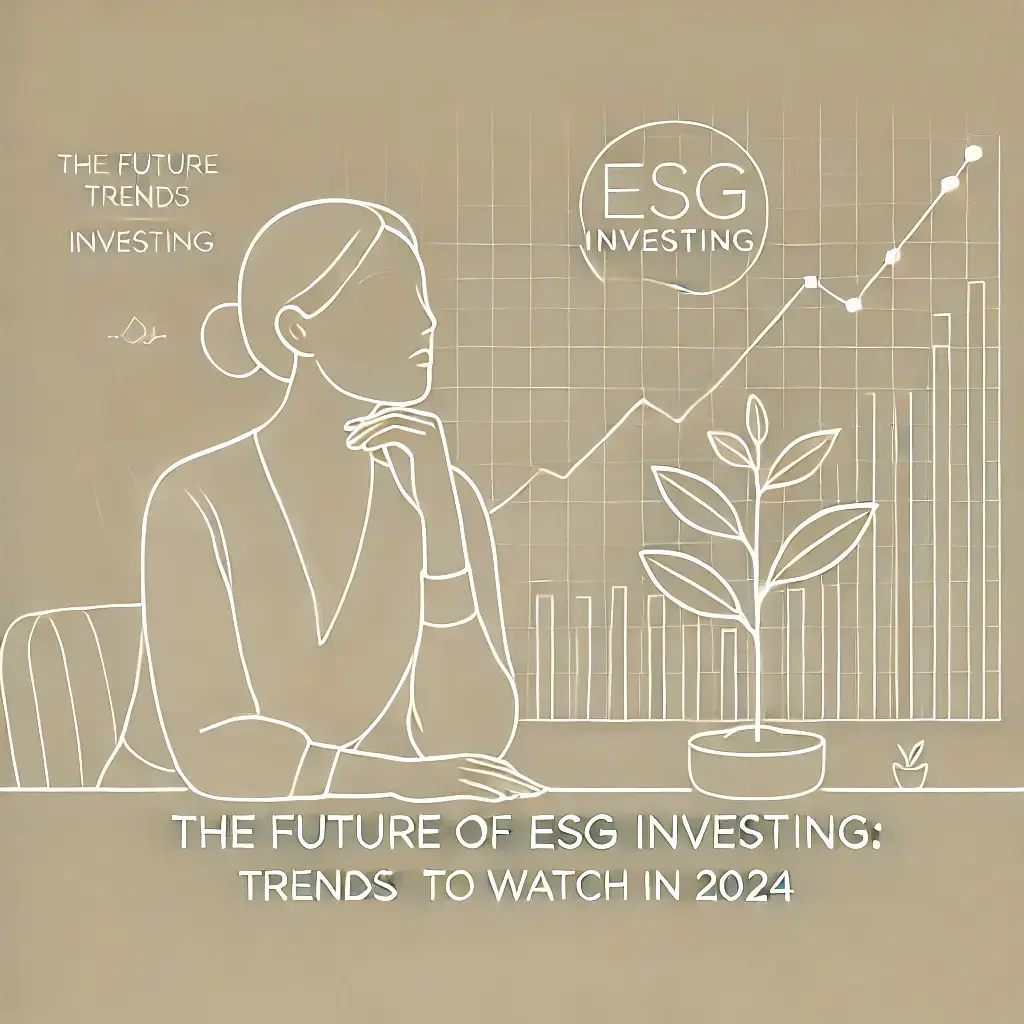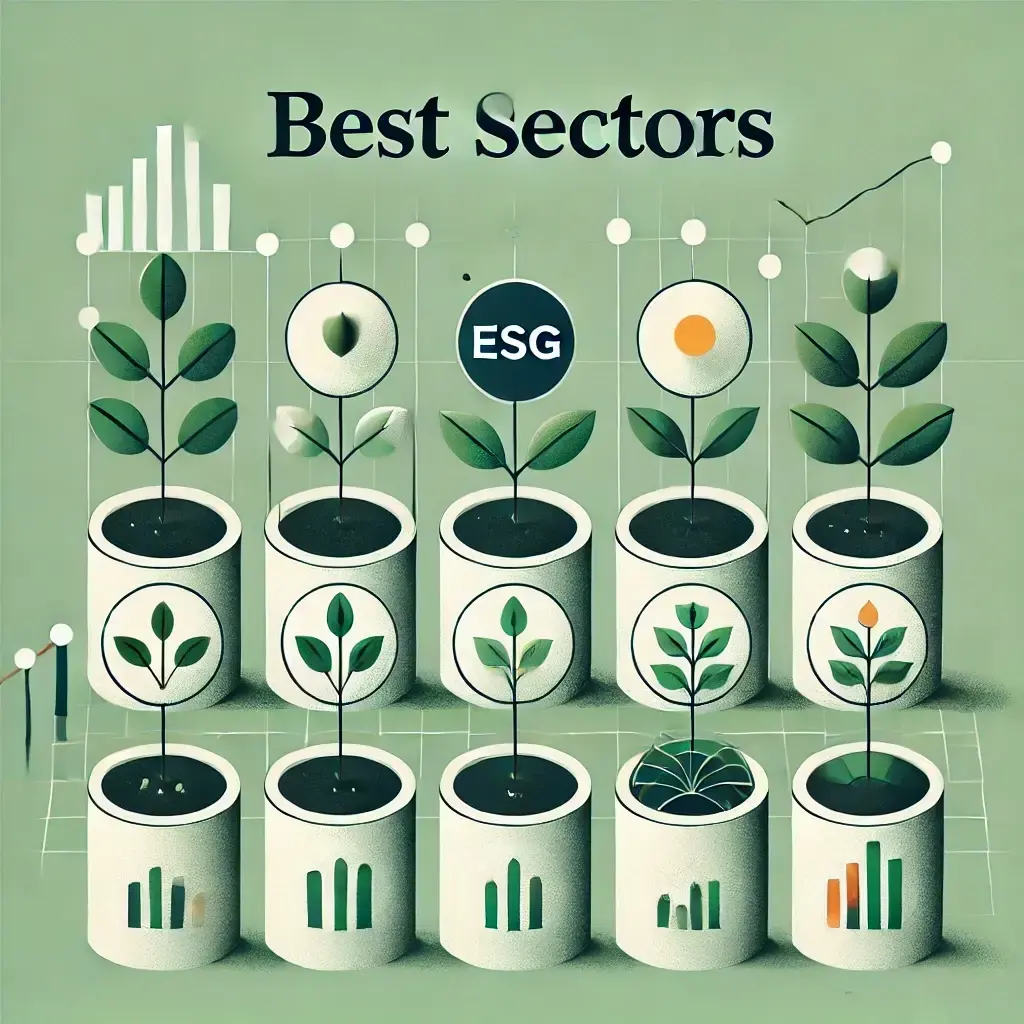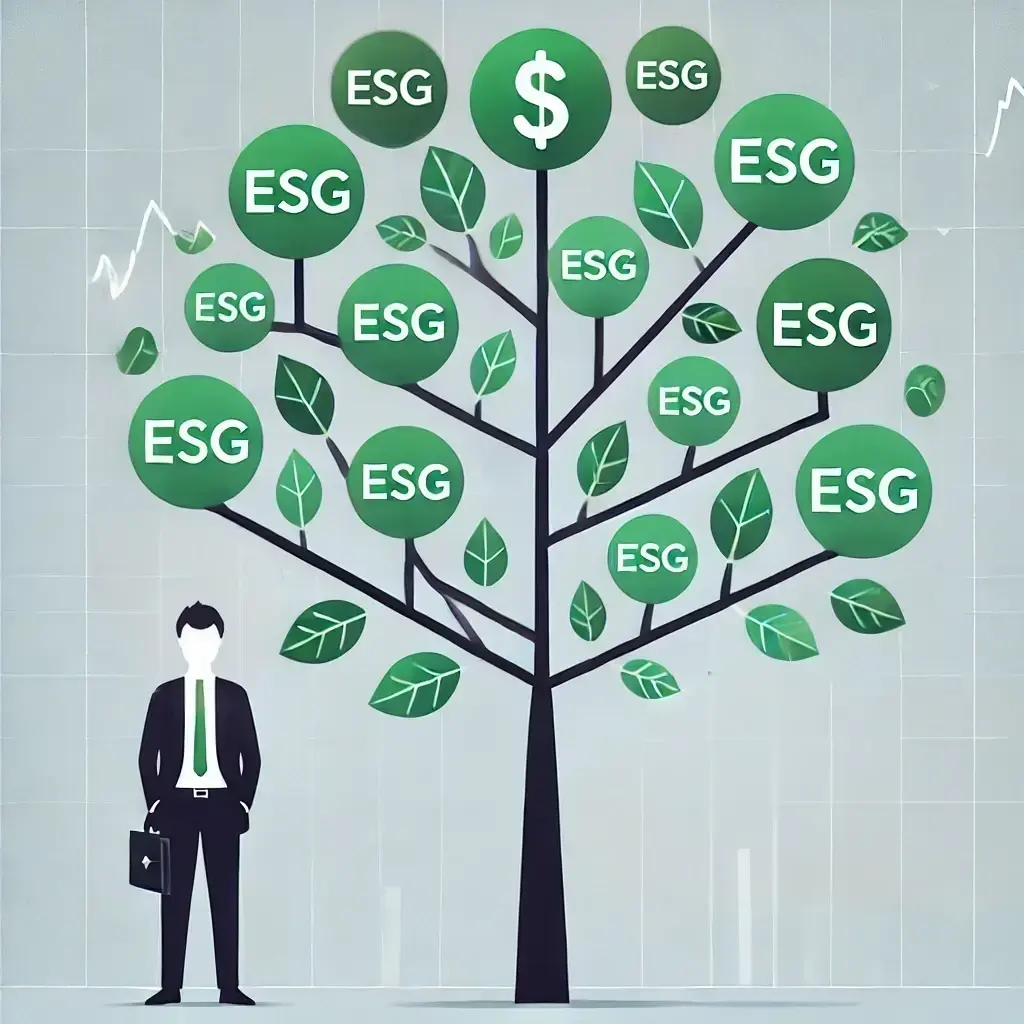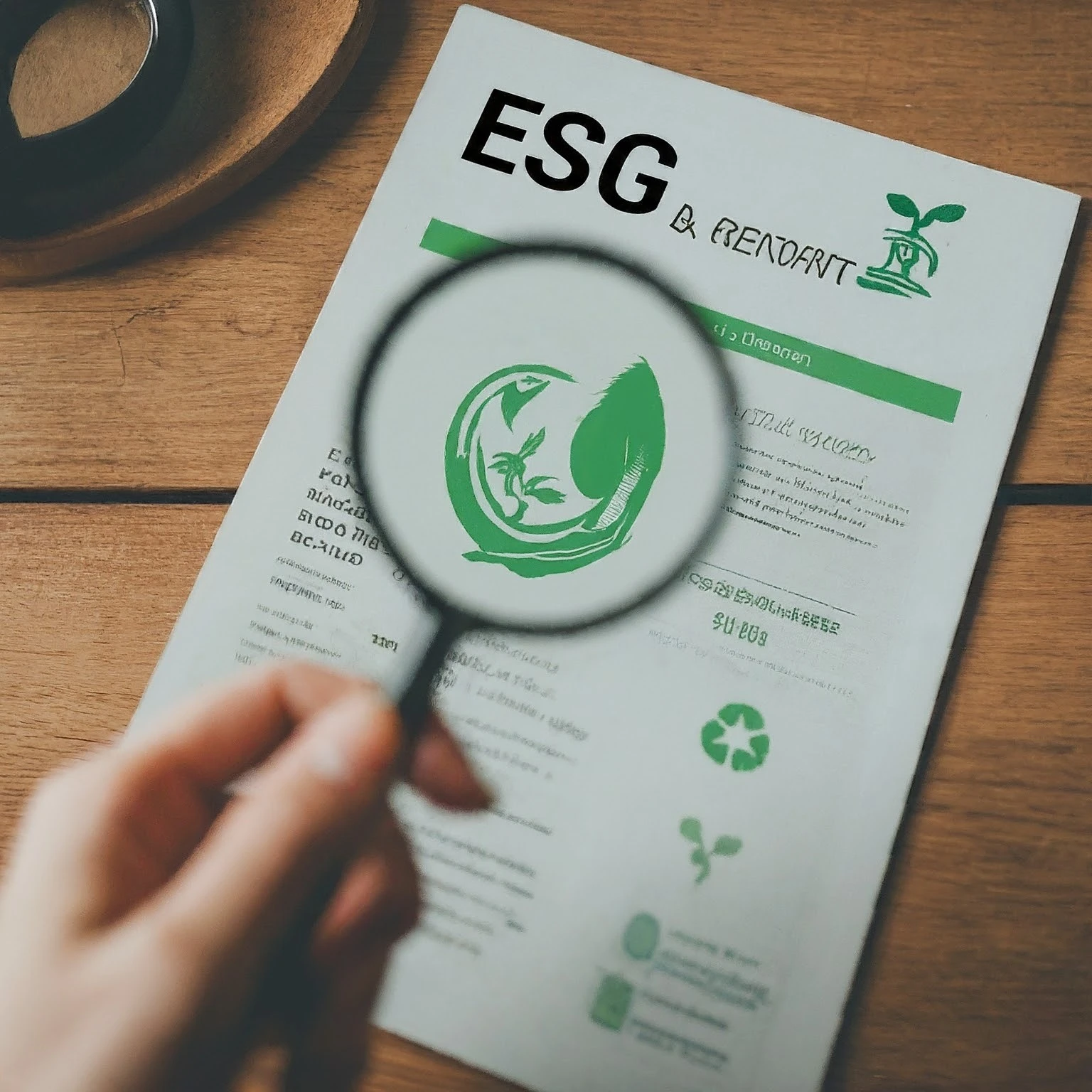
ESG Investing
ESG investing is an investment strategy that incorporates environmental, social, and governance (ESG) criteria into the decision-making process. Investors using this approach evaluate companies not only on financial performance but also on how they manage ESG factors, such as their impact on the environment, their relationships with employees and communities, and the quality of their governance practices. The goal of ESG investing is to achieve long-term financial returns while also contributing to positive societal outcomes. This strategy appeals to investors who want to align their investments with their values or who believe that companies with strong ESG practices are better positioned for sustainable growth and lower risk.
ESG Investing Guide




ESG Investing Glossary
- Anti-Corruption(Noun)
- /an-tee-kor-uhp-shuhn/
- Definition: Measures and practices implemented by companies to prevent and combat corruption, bribery, and unethical practices, ensuring compliance with laws and promoting transparency in business operations.
- Etymology: "Anti" from Greek "anti," meaning "against," and "corruption" from Latin "corruptio," meaning "decay or destruction." Anti-corruption efforts aim to maintain ethical standards and lawful practices within companies.
- Similar: Anti-bribery, Integrity
- Opposite: Corruption, Bribery
- Example: "The company’s anti-corruption policies include regular audits and training to ensure all employees adhere to ethical standards."
- Best-in-Class Investing(Noun)
- /best-in-klas in-ves-ting/
- Definition: An ESG investment strategy that selects companies with the highest performance in environmental, social, and governance criteria within their industry, even if the industry itself may have broader ESG challenges.
- Etymology: "Best" from Old English "betst," meaning "most excellent," "in-class" refers to the specific category or industry, and "investing" from Latin "investire," meaning "to clothe." Best-in-class investing focuses on leading ESG performers within each sector.
- Similar: ESG leader investing, Top-performer investing
- Opposite: Broad exclusion
- Example: "Best-in-class investing allows investors to support the top ESG performers in industries that may otherwise be seen as controversial."
- Biodiversity(Noun)
- /bahy-oh-di-vur-si-tee/
- Definition: The variety of plant and animal life in a particular habitat or ecosystem, often considered an indicator of environmental health and sustainability, with implications for corporate environmental practices.
- Etymology: "Bio" from Greek "bios," meaning "life," and "diversity" from Latin "diversitas," meaning "variety." Biodiversity represents the richness of species in an ecosystem, vital for environmental sustainability.
- Similar: Biological diversity, Ecosystem variety
- Opposite: Monoculture
- Example: "The company’s commitment to biodiversity includes initiatives to protect endangered species and restore natural habitats."
- Board Diversity(Noun)
- /bawrd dih-vur-si-tee/
- Definition: The inclusion of a variety of individuals with different backgrounds, perspectives, and experiences on a company's board of directors, often including gender, race, ethnicity, and professional diversity, to enhance decision-making and governance.
- Etymology: "Board" from Old English "bord," meaning "table," and "diversity" from Latin "diversitas," meaning "variety." Board diversity fosters varied perspectives and enhances corporate governance.
- Similar: Inclusive governance, Diverse leadership
- Opposite: Homogeneous board
- Example: "Board diversity has been linked to improved corporate performance and better decision-making outcomes."
- Business Ethics(Noun)
- /biz-nis eth-iks/
- Definition: The principles and standards that guide the behavior of individuals and organizations in business, ensuring fairness, transparency, and integrity in all operations and interactions.
- Etymology: "Business" from Old English "bisig," meaning "busy" and "ness," meaning "state of," and "ethics" from Greek "ethos," meaning "character." Business ethics define the moral framework within which companies operate.
- Similar: Corporate ethics, Ethical standards
- Opposite: Unethical practices
- Example: "Business ethics are critical for maintaining trust with customers, investors, and employees."
- Carbon Footprint(Noun)
- /kahr-buhn foot-print/
- Definition: The total amount of greenhouse gases, particularly carbon dioxide, that are emitted directly or indirectly by an individual, organization, event, or product, often measured in units of carbon dioxide equivalents.
- Etymology: "Carbon" from Latin "carbo," meaning "coal or charcoal," and "footprint" from Old English "fot," meaning "foot," and "print," meaning "impression." The carbon footprint measures environmental impact in terms of emissions.
- Similar: Carbon emissions, Environmental impact
- Opposite: Carbon neutrality
- Example: "The company is working to reduce its carbon footprint by adopting energy-efficient technologies and offsetting emissions."
- Carbon Neutral(Adjective)
- /kahr-buhn noo-truhl/
- Definition: The state of achieving net-zero carbon dioxide emissions by balancing emissions with carbon removal or offsetting, often through renewable energy, reforestation, or carbon capture initiatives.
- Etymology: "Carbon" from Latin "carbo," meaning "coal or charcoal," and "neutral" from Latin "neutralis," meaning "not taking sides." Carbon neutral refers to balancing carbon emissions with removal or offsets.
- Similar: Net-zero emissions, Climate neutral
- Opposite: Carbon positive
- Example: "By investing in renewable energy and carbon offsets, the company achieved carbon neutral status in 2023."
- Circular Economy(Noun)
- /sur-kyuh-ler ih-kon-uh-mee/
- Definition: An economic system aimed at minimizing waste and making the most of resources by reusing, repairing, refurbishing, and recycling materials and products, creating a closed-loop system that reduces environmental impact.
- Etymology: "Circular" from Latin "circulus," meaning "a circle," and "economy" from Greek "oikonomia," meaning "household management." The circular economy focuses on sustainability through continuous resource use.
- Similar: Sustainable economy, Closed-loop system
- Opposite: Linear economy
- Example: "The company’s adoption of a circular economy model has significantly reduced its waste output and resource consumption."
- Climate Change(Noun)
- /klahy-mit cheynj/
- Definition: Long-term alterations in temperature, precipitation, wind patterns, and other aspects of the earth's climate, primarily due to human activities such as burning fossil fuels, deforestation, and industrial processes.
- Etymology: "Climate" from Greek "klima," meaning "region or zone," and "change" from Old French "changier," meaning "to alter." Climate change refers to significant and lasting changes in global weather patterns.
- Similar: Global warming, Climate disruption
- Opposite: Climate stability
- Example: "Addressing climate change is a priority for the company, which has committed to reducing its greenhouse gas emissions."
- Climate Risk(Noun)
- /klahy-mit risk/
- Definition: The potential negative impacts of climate change on a company or investment, including physical risks from weather events and transition risks from changing regulations, technologies, and market conditions.
- Etymology: "Climate" from Greek "klima," meaning "region or zone," and "risk" from Old Italian "risco," meaning "danger." Climate risk involves the financial and operational threats posed by climate change.
- Similar: Environmental risk, Climate-related risk
- Opposite: Climate opportunity
- Example: "Investors are increasingly considering climate risk in their portfolio decisions, especially in sectors vulnerable to extreme weather."
- Community Engagement(Noun)
- /kuh-myoo-ni-tee en-geyj-muhnt/
- Definition: The process by which companies actively involve and collaborate with the communities in which they operate, fostering relationships, addressing local needs, and contributing to the community's well-being.
- Etymology: "Community" from Latin "communitas," meaning "common, public spirit," and "engagement" from French "engager," meaning "to involve." Community engagement involves active participation in local community development.
- Similar: Social engagement, Community involvement
- Opposite: Community neglect
- Example: "The company’s community engagement initiatives include volunteer programs and support for local education projects."
- Community Investing(Noun)
- /kuh-myoo-ni-tee in-ves-ting/
- Definition: An investment strategy that directs capital to communities underserved by traditional financial services, aiming to support local development, create jobs, and provide affordable housing and other essential services.
- Etymology: "Community" from Latin "communitas," meaning "common, public spirit," and "investing" from Latin "investire," meaning "to clothe." Community investing focuses on economic development and social improvement in marginalized areas.
- Similar: Social impact investing, Local investment
- Opposite: Traditional investing
- Example: "Community investing has helped bring affordable housing and financial services to underserved neighborhoods."
- Consumer Protection(Noun)
- /kuhn-soo-mer pruh-tek-shuhn/
- Definition: Safeguards and regulations designed to protect the rights of consumers, ensuring that products and services are safe, accurately described, and fairly priced, often a key component of corporate social responsibility.
- Etymology: "Consumer" from Latin "consumere," meaning "to use up," and "protection" from Latin "protectionem," meaning "a covering or defense." Consumer protection involves ensuring fair treatment and safety for consumers.
- Similar: Consumer rights, Consumer safety
- Opposite: Consumer exploitation
- Example: "The company’s commitment to consumer protection includes rigorous testing of products and transparent marketing practices."
- Corporate Citizenship(Noun)
- /kawr-prit sit-i-zuhn-ship/
- Definition: The role and responsibilities of a company in society, encompassing its contributions to economic development, ethical behavior, respect for the environment, and social responsibility, aiming to create a positive impact on all stakeholders.
- Etymology: "Corporate" from Latin "corporatus," meaning "formed into a body," and "citizenship" from Latin "civitas," meaning "state or citizenship." Corporate citizenship refers to a company's duties and contributions to society.
- Similar: Corporate responsibility, Business ethics
- Opposite: Corporate negligence
- Example: "Good corporate citizenship is demonstrated by the company’s efforts in sustainability and community engagement."
- Corporate Social Responsibility (CSR)(Noun)
- /kawr-prit soh-shuhl ri-spon-suh-bil-i-tee/
- Definition: A business model that integrates social and environmental concerns into a company’s operations and interactions with stakeholders, going beyond profit-making to contribute positively to society.
- Etymology: "Corporate" from Latin "corporatus," meaning "formed into a body," "social" from Latin "socialis," meaning "of companionship," and "responsibility" from Latin "responsibilis," meaning "answerable." CSR involves businesses taking responsibility for their social and environmental impact.
- Similar: CSR, Corporate responsibility
- Opposite: Corporate irresponsibility
- Example: "The company’s Corporate Social Responsibility (CSR) initiatives include sustainable sourcing and charitable contributions."
- Data Privacy(Noun)
- /dey-tuh pry-vuh-see/
- Definition: The protection of personal and sensitive information from unauthorized access or disclosure, ensuring that individuals' data is handled responsibly and securely by companies and organizations.
- Etymology: "Data" from Latin "datum," meaning "something given," and "privacy" from Latin "privatus," meaning "set apart or belonging to oneself." Data privacy involves securing personal information and respecting users' rights.
- Similar: Data protection, Information security
- Opposite: Data breach
- Example: "Data privacy regulations require companies to implement strict controls on how personal information is collected, stored, and used."
- Diversity and Inclusion(Noun)
- /dih-vur-si-tee and in-kloo-zhuhn/
- Definition: Policies and practices that promote representation and participation of diverse groups of people, including different genders, races, ethnicities, abilities, and other characteristics, ensuring equal opportunities and fostering an inclusive environment.
- Etymology: "Diversity" from Latin "diversitas," meaning "variety," and "inclusion" from Latin "includere," meaning "to enclose." Diversity and inclusion aim to create a welcoming environment that values different perspectives and experiences.
- Similar: Equal opportunity, Inclusive culture
- Opposite: Discrimination, Exclusion
- Example: "The company’s commitment to diversity and inclusion is reflected in its hiring practices and employee resource groups."
- Eco-Friendly(Adjective)
- /: ee-koh frend-lee/
- Definition: Products, practices, or services that do not harm the environment, often designed to minimize waste, reduce pollution, and conserve resources, contributing to sustainability.
- Etymology: "Eco" from Greek "oikos," meaning "house" or "environment," and "friendly" from Old English "freond," meaning "friend." Eco-friendly refers to actions or products that are environmentally safe.
- Similar: Environmentally friendly, Green
- Opposite: Polluting, Harmful
- Example: "The company’s commitment to eco-friendly products includes using biodegradable packaging and sustainable materials."
- Employee Welfare(Noun)
- /em-ploi-ee wel-fair/
- Definition: The overall well-being of employees, including their physical, mental, and financial health, often supported by workplace policies, benefits, and practices that promote a safe and supportive work environment.
- Etymology: "Employee" from French "employé," meaning "one who is employed," and "welfare" from Old English "wel faran," meaning "to fare well." Employee welfare encompasses the care and support provided to workers by their employer.
- Similar: Worker welfare, Employee well-being
- Opposite: Employee exploitation
- Example: "The company’s focus on employee welfare includes comprehensive health benefits, flexible working hours, and mental health support."
- Energy Efficiency(Noun)
- /en-er-jee ih-fish-uhn-see/
- Definition: The practice of using less energy to perform the same task or produce the same output, often through the adoption of advanced technologies, processes, and behaviors that reduce energy consumption and costs.
- Etymology: "Energy" from Greek "energeia," meaning "activity or operation," and "efficiency" from Latin "efficientia," meaning "effective production." Energy efficiency aims to minimize energy waste and lower environmental impact.
- Similar: Energy conservation, Resource efficiency
- Opposite: Energy wastefulness
- Example: "Investing in energy efficiency measures has significantly reduced the company’s operational costs and carbon footprint."
- Environmental Criteria(Noun)
- /en-vahy-ruhn-men-tl kry-teer-ee-uh/
- Definition: The environmental factors considered in ESG analysis, including a company’s impact on the natural environment, such as its carbon emissions, resource use, waste management, and pollution control efforts.
- Etymology: "Environmental" from French "environ," meaning "surround," and "criteria" from Greek "kriterion," meaning "a means for judging." Environmental criteria evaluate the ecological aspects of a company’s operations.
- Similar: Environmental standards, Sustainability criteria
- Example: "Environmental criteria are a key component of ESG analysis, helping investors assess a company’s sustainability practices."
- Environmental Impact(Noun)
- /en-vahy-ruhn-men-tl im-pakt/
- Definition: The effect that a company’s activities, products, and services have on the natural environment, including factors like pollution, resource depletion, and ecosystem disruption, often assessed as part of ESG analysis.
- Etymology: "Environmental" from French "environ," meaning "surround," and "impact" from Latin "impactus," meaning "to press or drive against." Environmental impact refers to the consequences of actions on the natural world.
- Similar: Ecological impact, Environmental effect
- Opposite: Environmental preservation (in some contexts)
- Example: "The company is committed to reducing its environmental impact through sustainable sourcing and waste reduction programs."
- Environmental Stewardship(Noun)
- /en-vahy-ruhn-men-tl stoo-werd-ship/
- Definition: The responsible management and care of the natural environment by individuals, organizations, or companies, often involving practices that protect ecosystems, conserve resources, and reduce environmental harm.
- Etymology: "Environmental" from French "environ," meaning "surround," and "stewardship" from Old English "stiward," meaning "household guardian." Environmental stewardship involves actively caring for and preserving the environment.
- Similar: Ecological stewardship, Environmental management
- Opposite: Environmental neglect
- Example: "Environmental stewardship is a core value of the company, guiding its efforts to minimize its ecological footprint."
- ESG(Noun)
- /ee-es-jee/
- Definition: Environmental, Social, and Governance; a set of criteria used by investors to evaluate the sustainability and ethical impact of an investment in a company, considering factors like environmental practices, social responsibility, and corporate governance.
- Etymology: "Environmental" from Latin "environ," meaning "surround," "social" from Latin "socialis," meaning "of companionship," and "governance" from Greek "kubernan," meaning "to steer." ESG represents the three key areas of concern in sustainable investing.
- Similar: Sustainable investing, Responsible investing
- Opposite: Traditional investing (in some contexts)
- Example: "ESG criteria are increasingly used by investors to assess the long-term sustainability and ethical impact of their investments."
- ESG Advisory(Noun)
- /ee-es-jee ad-vahy-zuh-ree/
- Definition: Professional services that guide companies and investors on how to integrate ESG criteria into their strategies, operations, and investment decisions, helping them improve sustainability practices and meet stakeholder expectations.
- Etymology: "ESG" (see above) and "advisory" from Old French "avis," meaning "opinion or advice." ESG advisory services provide expert guidance on incorporating sustainability into business and investment practices.
- Similar: ESG consulting, Sustainability advisory
- Example: "The company hired an ESG advisory firm to help enhance its sustainability initiatives and improve its ESG rating."
- ESG Benchmark(Noun)
- /ee-es-jee bench-mahrk/
- Definition: A standard or point of reference used to measure and compare a company’s ESG performance against peers, often based on specific ESG metrics, helping investors assess relative sustainability and ethical practices.
- Etymology: "ESG" (see above) and "benchmark" from Old English "benc," meaning "bench," and "mark," meaning "a sign." An ESG benchmark serves as a standard for evaluating and comparing ESG performance across companies.
- Similar: ESG standard, Sustainability benchmark
- Example: "The ESG benchmark helped investors compare the company’s environmental and social performance with that of its competitors."
- ESG Compliance(Noun)
- /ee-es-jee kuhm-plahy-uhns/
- Definition: The adherence to environmental, social, and governance standards and regulations by companies, ensuring that they meet legal and ethical requirements, often monitored by internal policies and external audits.
- Etymology: "ESG" (see above) and "compliance" from Latin "compliance," meaning "the act of fulfilling." ESG compliance involves following rules and regulations related to sustainability and ethical practices.
- Similar: ESG adherence, Sustainability compliance
- Opposite: ESG non-compliance
- Example: "Maintaining ESG compliance is crucial for companies to avoid legal penalties and enhance their reputation with stakeholders."
- ESG Disclosure(Noun)
- /ee-es-jee dis-kloh-zher/
- Definition: The process by which companies publicly report their ESG performance, including environmental impact, social contributions, and governance practices, allowing investors and stakeholders to assess their sustainability efforts.
- Etymology: "ESG" (see above) and "disclosure" from Old French "disclos," meaning "open or exposed." ESG disclosure involves making information about a company's sustainability practices available to the public.
- Similar: Sustainability reporting, ESG transparency
- Opposite: ESG non-disclosure
- Example: "ESG disclosure is increasingly important for companies seeking to build trust with investors and the public."
- ESG Due Diligence(Noun)
- /ee-es-jee doo dil-i-juhns/
- Definition: The process of assessing a company’s ESG risks and opportunities as part of an investment decision, involving a thorough review of its environmental, social, and governance practices to ensure alignment with investor values and goals.
- Etymology: "ESG" (see above) and "due diligence" from Latin "diligentia," meaning "carefulness." ESG due diligence involves careful evaluation of a company's sustainability practices before making investment decisions.
- Similar: ESG assessment, Sustainability evaluation
- Opposite: ESG negligence
- Example: "Investors performed ESG due diligence to ensure the company met their environmental and social criteria before proceeding with the investment."
- ESG Engagement(Noun)
- /ee-es-jee en-geyj-muhnt/
- Definition: The process of investors actively interacting with companies to encourage improved ESG practices, such as through dialogue, shareholder resolutions, or voting on corporate policies, to drive positive change.
- Etymology: "ESG" (see above) and "engagement" from Old French "engager," meaning "to involve." ESG engagement involves investors working with companies to enhance their sustainability and governance practices.
- Similar: Active ownership, Shareholder engagement
- Opposite: Passive investing
- Example: "ESG engagement has led to significant improvements in the company’s environmental practices and corporate transparency."
- ESG ETF(Noun)
- /ee-es-jee ee-tee-ef/
- Definition: An exchange-traded fund (ETF) that focuses on companies meeting specific ESG criteria, allowing investors to gain exposure to a diversified portfolio of sustainable and ethically managed companies.
- Etymology: "ESG" (see above) and "ETF" from "exchange-traded fund." An ESG ETF offers investors a way to invest in a basket of companies with strong environmental, social, and governance practices.
- Similar: Sustainable ETF, Responsible investing ETF
- Opposite: Traditional ETF (in some contexts)
- Example: "Investing in an ESG ETF allows individuals to support companies with strong sustainability and governance practices while diversifying their portfolio."
- ESG Fund(Noun)
- /ee-es-jee fuhnd/
- Definition: A mutual fund or investment fund that invests in companies selected based on their performance in environmental, social, and governance criteria, aiming to provide financial returns while promoting sustainability.
- Etymology: "ESG" (see above) and "fund" from Old French "fons," meaning "source or spring." An ESG fund focuses on investments in companies with strong sustainability practices.
- Similar: Sustainable fund, Responsible investment fund
- Opposite: Traditional fund
- Example: "An ESG fund allows investors to align their financial goals with their values by supporting companies that prioritize sustainability."
- ESG Integration(Noun)
- /ee-es-jee in-teg-ray-shuhn/
- Definition: The practice of incorporating environmental, social, and governance factors into investment analysis and decision-making, considering these criteria alongside traditional financial metrics to assess the long-term sustainability and risk of investments.
- Etymology: "ESG" (see above) and "integration" from Latin "integratio," meaning "renewal or restoration." ESG integration involves blending sustainability considerations into the overall investment process.
- Similar: ESG incorporation, Sustainable investing integration
- Opposite: ESG exclusion
- Example: "ESG integration has become a standard practice for many investment managers seeking to balance financial returns with ethical considerations."
- ESG Leadership(Noun)
- /ee-es-jee lee-der-ship/
- Definition: The role of companies or individuals in leading and promoting best practices in environmental, social, and governance issues, often setting benchmarks for others in the industry to follow.
- Etymology: "ESG" (see above) and "leadership" from Old English "lædere," meaning "one who leads." ESG leadership involves setting the standard in sustainability and ethical business practices.
- Similar: Sustainability leadership, Ethical leadership
- Opposite: ESG laggard
- Example: "The company’s ESG leadership has made it a model for sustainable business practices in the industry."
- ESG Materiality(Noun)
- /: ee-es-jee muh-teer-ee-al-i-tee/
- Definition: The determination of which environmental, social, and governance issues are most relevant to a company’s financial performance and stakeholder interests, guiding where to focus ESG efforts and disclosures.
- Etymology: "ESG" (see above) and "materiality" from Latin "materialis," meaning "of matter or substance." ESG materiality identifies key sustainability issues that significantly impact a company’s success.
- Similar: Sustainability relevance, ESG significance
- Opposite: ESG triviality
- Example: "Understanding ESG materiality helps companies prioritize the issues that matter most to their business and stakeholders."
- ESG Metrics(Noun)
- /ee-es-jee me-triks/
- Definition: Quantitative and qualitative measures used to evaluate a company’s performance on environmental, social, and governance criteria, helping investors and stakeholders assess sustainability and ethical practices.
- Etymology: "ESG" (see above) and "metrics" from Greek "metron," meaning "measure." ESG metrics provide data points to assess a company’s adherence to sustainability practices.
- Similar: Sustainability metrics, ESG indicators
- Opposite: Financial metrics (in some contexts)
- Example: "ESG metrics such as carbon emissions, diversity ratios, and governance scores are critical for evaluating a company’s sustainability performance."
- ESG Portfolio(Noun)
- /: ee-es-jee pawrt-foh-lee-oh/
- Definition: A collection of investments specifically chosen for their strong environmental, social, and governance performance, aiming to generate financial returns while supporting sustainable and ethical practices.
- Etymology: "ESG" (see above) and "portfolio" from Italian "portafoglio," meaning "a case for carrying documents." An ESG portfolio consists of investments that meet defined sustainability and ethical standards.
- Similar: Sustainable portfolio, Responsible investment portfolio
- Opposite: Traditional portfolio
- Example: "Her ESG portfolio focuses on companies with strong records in environmental stewardship and social responsibility."
- ESG Rating(Noun)
- /ee-es-jee rey-ting/
- Definition: A score or ranking assigned to companies based on their environmental, social, and governance performance, often provided by independent rating agencies, to help investors evaluate the sustainability of potential investments.
- Etymology: "ESG" (see above) and "rating" from Old English "hrat," meaning "swift," evolving to mean "assessment." An ESG rating assesses a company’s sustainability practices.
- Similar: Sustainability rating, ESG score
- Example: "Investors rely on ESG ratings to identify companies that are leaders in sustainability and ethical governance."
- ESG Reporting(Noun)
- /ee-es-jee ri-pawr-ting/
- Definition: The process by which companies publicly disclose information about their ESG performance, including their environmental impact, social initiatives, and governance practices, typically through annual or sustainability reports.
- Etymology: "ESG" (see above) and "reporting" from Old French "reporter," meaning "to bring back." ESG reporting involves the publication of data on a company’s sustainability practices.
- Similar: Sustainability reporting, ESG disclosure
- Opposite: Non-reporting
- Example: "ESG reporting has become a key tool for companies to demonstrate their commitment to sustainability and social responsibility."
- ESG Score(Noun)
- /ee-es-jee skawr/
- Definition: A numerical or qualitative score given to a company based on its environmental, social, and governance performance, used by investors and stakeholders to evaluate the company’s adherence to sustainability and ethical standards.
- Etymology: "ESG" (see above) and "score" from Old Norse "skor," meaning "mark or notch." An ESG score reflects the overall sustainability performance of a company.
- Similar: ESG rating, Sustainability score
- Example: "The company’s high ESG score attracted investors looking for sustainable investment opportunities."
- ESG Stewardship(Noun)
- /ee-es-jee stoo-werd-ship/
- Definition: The responsibility of managing and overseeing a company’s ESG practices, often involving active engagement with stakeholders to ensure that environmental, social, and governance issues are prioritized and addressed effectively.
- Etymology: "ESG" (see above) and "stewardship" from Old English "stiward," meaning "household guardian." ESG stewardship involves guiding a company’s approach to sustainability and ethical practices.
- Similar: Sustainability stewardship, Responsible management
- Opposite: Negligence
- Example: "Effective ESG stewardship ensures that a company remains accountable to its environmental, social, and governance commitments."
- Ethical Fund(Noun)
- /eth-i-kuhl fuhnd/
- Definition: An investment fund that selects companies based on ethical criteria, often excluding industries or companies involved in activities considered harmful or unethical, such as tobacco, weapons, or fossil fuels.
- Etymology: "Ethical" from Greek "ethikos," meaning "relating to character," and "fund" from Old French "fons," meaning "source or spring." An ethical fund prioritizes investments in companies that align with specific moral values.
- Similar: Responsible fund, Moral investment fund
- Opposite: Unrestricted fund
- Example: "Investors looking to align their investments with their personal values often choose ethical funds that avoid industries like tobacco and fossil fuels."
- Ethical Screening(Noun)
- /eth-i-kuhl skree-ning/
- Definition: The process of evaluating potential investments based on ethical criteria, including the exclusion of companies involved in activities deemed harmful or unethical, and the inclusion of those that meet certain ethical standards.
- Etymology: "Ethical" from Greek "ethikos," meaning "relating to character," and "screening" from Old French "escrein," meaning "protective shield." Ethical screening helps investors filter out companies that do not align with their moral values.
- Similar: Moral screening, Responsible investing
- Opposite: Unscreened investing
- Example: "Ethical screening allows investors to avoid companies that engage in practices contrary to their values, such as environmental degradation or labor exploitation."
- Ethical Standards(Noun)
- /eth-i-kuhl stan-derd/
- Definition: The moral principles and guidelines that govern the behavior of individuals, organizations, or companies, ensuring that their actions align with ethical norms and values, particularly in business practices and decision-making.
- Etymology: "Ethical" from Greek "ethikos," meaning "relating to character," and "standards" from Old French "estandart," meaning "rallying point." Ethical standards define acceptable conduct in business and society.
- Similar: Moral standards, Ethical guidelines
- Opposite: Unethical behavior
- Example: "The company’s commitment to ethical standards is evident in its fair labor practices and transparent governance."
- Exclusionary Screening(Noun)
- /eks-kloo-zhuh-ner-ee skree-ning/
- Definition: An investment strategy that excludes certain companies, sectors, or industries from consideration based on ethical, environmental, or social criteria, often used to avoid investments in areas like tobacco, fossil fuels, or weapons.
- Etymology: "Exclusionary" from Latin "excludere," meaning "to shut out," and "screening" from Old French "escrein," meaning "protective shield." Exclusionary screening removes companies that do not meet specific ethical criteria from an investment portfolio.
- Similar: Negative screening, Ethical exclusion
- Opposite: Inclusionary screening
- Example: "Exclusionary screening is often used by ethical funds to avoid investing in industries like fossil fuels or tobacco."
- Executive Compensation(Noun)
- /ig-zek-yuh-tiv kom-puhn-sey-shuhn/
- Definition: The financial and non-financial rewards given to corporate executives, including salary, bonuses, stock options, and benefits, often scrutinized in ESG analysis to ensure alignment with company performance and stakeholder interests.
- Etymology: "Executive" from Latin "exsequi," meaning "to follow out," and "compensation" from Latin "compensatio," meaning "a balancing." Executive compensation involves the payment and benefits provided to top company executives.
- Similar: Executive pay, CEO compensation
- Opposite: Worker compensation (in some contexts)
- Example: "The company’s executive compensation is closely linked to its ESG performance, ensuring that leaders are rewarded for sustainable practices."
- Fair Trade(Noun)
- /fair treyd/
- Definition: A social movement and market-based approach aimed at helping producers in developing countries achieve better trading conditions, ensuring fair prices, ethical treatment, and sustainable practices in the production of goods.
- Etymology: "Fair" from Old English "fæger," meaning "beautiful or pleasant," and "trade" from Old English "træd," meaning "path or course." Fair trade emphasizes ethical trading relationships that benefit producers in developing regions.
- Similar: Ethical trade, Equitable trade
- Opposite: Unfair trade
- Example: "The company sources its coffee beans through fair trade agreements, ensuring that farmers receive a fair price and work in safe conditions."
- Fossil Fuel Divestment(Noun)
- /fos-uhl fyool dih-vest-muhnt/
- Definition: The process of selling off investments in companies involved in extracting or using fossil fuels, often driven by concerns about climate change and the desire to shift capital toward more sustainable energy sources.
- Etymology: "Fossil" from Latin "fossilis," meaning "dug up," "fuel" from Old French "feu," meaning "fire," and "divestment" from Latin "divestire," meaning "to strip of clothes or rights." Fossil fuel divestment involves removing investments from companies that produce or rely on fossil fuels.
- Similar: Divestment, Disinvestment
- Opposite: Fossil fuel investment
- Example: "Many universities and pension funds have committed to fossil fuel divestment as part of their broader climate action strategies."
- Governance Criteria(Noun)
- /guhv-er-nuhns kry-teer-ee-uh/
- Definition: The standards and practices used to evaluate a company’s governance, including board structure, executive compensation, shareholder rights, transparency, and ethical conduct, essential in ESG assessments.
- Etymology: "Governance" from Greek "kubernan," meaning "to steer," and "criteria" from Greek "kriterion," meaning "a means for judging." Governance criteria assess how a company is managed and how it adheres to ethical and transparent practices.
- Similar: Governance standards, Corporate governance criteria
- Example: "Strong governance criteria include transparency in executive compensation and a commitment to shareholder rights."
- Governance Risk(Noun)
- /guhv-er-nuhns risk/
- Definition: The potential for poor corporate governance to negatively impact a company’s performance, reputation, or stakeholder relationships, often considered in ESG analysis to assess the stability and ethical standards of management.
- Etymology: "Governance" from Greek "kubernan," meaning "to steer," and "risk" from Old Italian "risco," meaning "danger." Governance risk involves the dangers associated with inadequate or unethical corporate governance practices.
- Similar: Corporate governance risk, Management risk
- Opposite: Governance stability
- Example: "Investors are increasingly aware of governance risk, particularly in companies with opaque board practices and weak shareholder rights."
- Green Bonds(Noun)
- /green bonds/
- Definition: Bonds specifically issued to finance projects with positive environmental impacts, such as renewable energy, clean water, and sustainable agriculture, offering investors a way to support green initiatives while earning a return.
- Etymology: "Green" from Old English "grene," meaning "the color of living plants," and "bonds" from Old English "bonda," meaning "one who binds." Green bonds fund environmentally beneficial projects.
- Similar: Climate bonds, Environmental bonds
- Opposite: Traditional bonds (in some contexts)
- Example: "Green bonds have become a popular way for investors to support projects that address climate change while earning a stable return."
- Green Finance(Noun)
- /green fi-nans/
- Definition: Financial activities and products that support environmental sustainability, including investments in renewable energy, energy efficiency, green bonds, and other initiatives aimed at reducing environmental impact.
- Etymology: "Green" from Old English "grene," meaning "the color of living plants," and "finance" from Latin "financia," meaning "payment." Green finance involves funding initiatives that promote environmental sustainability.
- Similar: Sustainable finance, Environmental finance
- Opposite: Conventional finance
- Example: "Green finance is critical for driving the transition to a low-carbon economy and supporting sustainable development goals."
- Green Fund(Noun)
- /green fuhnd/
- Definition: An investment fund that specifically focuses on companies and projects with positive environmental impacts, such as renewable energy, energy efficiency, and sustainable agriculture, aligning financial returns with environmental stewardship.
- Etymology: "Green" from Old English "grene," meaning "the color of living plants," and "fund" from Old French "fons," meaning "source or spring." A green fund invests in environmentally sustainable projects and companies.
- Similar: Environmental fund, Eco-friendly fund
- Opposite: Traditional fund
- Example: "Investors in a green fund can support environmental sustainability while seeking financial returns from eco-friendly companies."
- Greenhouse Gas Emissions(Noun)
- /green-hous gas i-mish-uhns/
- Definition: The release of gases, such as carbon dioxide and methane, that trap heat in the earth's atmosphere, contributing to global warming and climate change, often a key focus in ESG environmental criteria.
- Etymology: "Greenhouse" from Old English "grene" and "house," meaning "structure for growing plants," and "emissions" from Latin "emittere," meaning "to send out." Greenhouse gas emissions are a primary driver of climate change.
- Similar: Carbon emissions, GHG emissions
- Opposite: Emission reductions
- Example: "The company has committed to reducing its greenhouse gas emissions by 50% by 2030 as part of its sustainability strategy."
- Greenwashing(Noun)
- /green-wosh-ing/
- Definition: The practice of companies presenting themselves as more environmentally friendly than they actually are, often through misleading marketing, to capitalize on consumer demand for sustainable products.
- Etymology: "Green" from Old English "grene," meaning "the color of living plants," and "washing" from Old English "wæscan," meaning "to cleanse." Greenwashing deceives consumers into believing a company’s practices or products are more environmentally friendly than they are.
- Similar: Eco-fakery, False sustainability claims
- Opposite: Genuine sustainability
- Example: "Greenwashing can damage a company’s reputation if consumers discover that its environmental claims are exaggerated or false."
- Health and Safety(Noun)
- /helth and seyf-tee/
- Definition: The regulations, practices, and policies put in place by companies to protect the physical well-being of their employees and others affected by their operations, often a critical component of social criteria in ESG analysis.
- Etymology: "Health" from Old English "hælu," meaning "wholeness," and "safety" from Old French "sauf," meaning "protected." Health and safety practices ensure that workplaces are secure and free from hazards.
- Similar: Occupational safety, Workplace safety
- Opposite: Workplace hazards
- Example: "The company’s commitment to health and safety is evident in its rigorous training programs and strict compliance with safety regulations."
- Human Rights(Noun)
- /hyoo-muhn rahyts/
- Definition: The basic rights and freedoms that belong to every person, including the right to life, liberty, and equality, often a focus in ESG criteria to ensure that companies respect and uphold these rights in their operations and supply chains.
- Etymology: "Human" from Latin "humanus," meaning "of or belonging to man," and "rights" from Old English "riht," meaning "just or fair." Human rights are fundamental entitlements that must be respected and protected by all entities.
- Similar: Civil rights, Fundamental rights
- Opposite: Human rights violations
- Example: "The company has implemented a human rights policy to ensure that all workers in its supply chain are treated fairly and with dignity."
- Impact Measurement(Noun)
- /im-pakt mezh-er-muhnt/
- Definition: The process of evaluating the social, environmental, and economic effects of an organization’s activities, often used in ESG investing to assess the tangible outcomes of investments in terms of sustainability and social responsibility.
- Etymology: "Impact" from Latin "impactus," meaning "struck against," and "measurement" from Latin "mensurare," meaning "to measure." Impact measurement assesses the real-world effects of a company’s actions or an investment’s outcomes.
- Similar: Impact assessment, Outcome measurement
- Opposite: Non-measurement
- Example: "Investors are increasingly demanding impact measurement to understand the true social and environmental outcomes of their investments."
- Labor Practices(Noun)
- /ley-ber prak-tis-es/
- Definition: The policies and practices related to the treatment of workers, including wages, working conditions, health and safety, and rights, often a key focus in ESG analysis to ensure fair and ethical treatment of employees.
- Etymology: "Labor" from Latin "labor," meaning "work," and "practices" from Greek "praktikos," meaning "fit for action." Labor practices encompass how employees are treated and managed in a workplace.
- Similar: Employment practices, Worker treatment
- Opposite: Labor exploitation
- Example: "The company’s labor practices include fair wages, safe working conditions, and respect for workers’ rights, aligning with its ESG commitments."
- Long-Term Value(Noun)
- /lawng-turm val-yoo/
- Definition: The enduring worth or benefits derived from an investment or business strategy, emphasizing sustainable growth, responsible management, and lasting positive impacts rather than short-term profits.
- Etymology: "Long-term" from Old English "lang" (long) and "term" from Latin "terminus," meaning "end," and "value" from Latin "valere," meaning "to be worth." Long-term value focuses on sustainable and enduring benefits.
- Similar: Sustainable value, Enduring value
- Opposite: Short-term gain
- Example: "Investors focused on long-term value prioritize companies that demonstrate sustainable business practices and a commitment to ESG principles."
- Low Carbon(Adjective)
- /loh kahr-buhn/
- Definition: Referring to activities, products, or processes that produce a minimal amount of carbon dioxide emissions, often a goal in ESG strategies to mitigate climate change and reduce environmental impact.
- Etymology: "Low" from Old English "lah," meaning "not high," and "carbon" from Latin "carbo," meaning "coal or charcoal." Low carbon initiatives aim to reduce carbon dioxide emissions associated with energy use and industrial processes.
- Similar: Carbon-light, Carbon-efficient
- Opposite: High carbon
- Example: "The company’s shift to low carbon technologies has significantly reduced its greenhouse gas emissions and improved its ESG score."
- Negative Screening(Noun)
- /neg-uh-tiv skree-ning/
- Definition: An investment strategy that excludes companies or sectors from a portfolio based on certain ESG criteria, such as involvement in tobacco, fossil fuels, or weapons, to avoid supporting industries that are seen as harmful.
- Etymology: "Negative" from Latin "negativus," meaning "denying," and "screening" from Old French "escrein," meaning "protective shield." Negative screening filters out investments that do not align with specific ethical standards.
- Similar: Exclusionary screening, Ethical exclusion
- Opposite: Positive screening
- Example: "Negative screening is often used by socially responsible investors to exclude companies that do not meet their ethical or environmental criteria."
- Net Zero(Noun)
- /net zeer-oh/
- Definition: Achieving a balance between the amount of greenhouse gas emissions produced and the amount removed from the atmosphere, often through carbon offsetting or other environmental initiatives, to mitigate climate change.
- Etymology: "Net" from Old English "nett," meaning "a network," and "zero" from French "zero," meaning "nothing." Net zero refers to the equilibrium where no net greenhouse gas emissions are added to the atmosphere.
- Similar: Carbon neutral, Climate neutral
- Opposite: Carbon positive
- Example: "The company has committed to achieving net zero emissions by 2040 through a combination of renewable energy use and carbon offsets."
- Pollution Control(Noun)
- /puh-loo-shuhn kuhn-trohl/
- Definition: The measures and technologies used to reduce or eliminate the release of harmful substances into the environment, often a key aspect of environmental criteria in ESG analysis, focusing on minimizing air, water, and soil pollution.
- Etymology: "Pollution" from Latin "pollutio," meaning "defilement," and "control" from Latin "contra," meaning "against," and "rotulus," meaning "a roll or list." Pollution control involves managing and reducing environmental contaminants.
- Similar: Environmental protection, Emission control
- Opposite: Pollution
- Example: "Investments in pollution control technologies have significantly reduced the company’s environmental impact and improved its ESG rating."
- Positive Screening(Noun)
- /poz-i-tiv skree-ning/
- Definition: An investment strategy that actively selects companies or sectors based on their strong ESG performance, focusing on those that demonstrate leadership in environmental sustainability, social responsibility, and ethical governance.
- Etymology: "Positive" from Latin "positivus," meaning "to place or set," and "screening" from Old French "escrein," meaning "protective shield." Positive screening involves selecting investments based on desirable ESG attributes.
- Similar: Inclusionary screening, Best-in-class investing
- Opposite: Negative screening
- Example: "Positive screening allows investors to build portfolios that align with their values by focusing on companies with exemplary ESG practices."
- Renewable Energy(Noun)
- /ri-noo-uh-buhl en-er-jee/
- Definition: Energy derived from natural sources that are replenished at a faster rate than they are consumed, such as solar, wind, hydro, and geothermal energy, often a focus in ESG investing due to its low environmental impact.
- Etymology: "Renewable" from Latin "renovare," meaning "to renew," and "energy" from Greek "energeia," meaning "activity or operation." Renewable energy is a key component of sustainable development and climate action.
- Similar: Sustainable energy, Green energy
- Opposite: Non-renewable energy
- Example: "Investing in renewable energy projects supports the transition to a low-carbon economy and aligns with ESG principles."
- Renewable Resources(Noun)
- /ri-noo-uh-buhl ree-sawrs-es/
- Definition: Natural resources that can be replenished naturally over time, such as solar energy, wind, water, and biomass, often used in ESG analysis to evaluate a company’s sustainability and environmental impact.
- Etymology: "Renewable" from Latin "renovare," meaning "to renew," and "resources" from Old French "resourdre," meaning "to rise again." Renewable resources are essential for sustainable development and environmental conservation.
- Similar: Sustainable resources, Regenerative resources
- Opposite: Non-renewable resources
- Example: "The company’s commitment to using renewable resources has reduced its dependence on fossil fuels and lowered its environmental footprint."
- Responsible Capital(Noun)
- /ri-spon-suh-buhl kap-i-tl/
- Definition: Investment capital that is allocated with consideration for ESG factors, aiming to generate positive social and environmental outcomes in addition to financial returns, often associated with impact investing and sustainable finance.
- Etymology: "Responsible" from Latin "responsabilis," meaning "answerable," and "capital" from Latin "capitalis," meaning "of the head." Responsible capital is used to fund investments that align with ethical and sustainable goals.
- Similar: Sustainable capital, Ethical capital
- Opposite: Unrestricted capital
- Example: "Responsible capital is increasingly being directed toward projects that address climate change, social inequality, and other critical global challenges."
- Responsible Governance(Noun)
- /ri-spon-suh-buhl guhv-er-nuhns/
- Definition: The practice of managing a company in a way that prioritizes ethical standards, transparency, accountability, and stakeholder interests, ensuring that the company operates in a socially and environmentally responsible manner.
- Etymology: "Responsible" from Latin "responsabilis," meaning "answerable," and "governance" from Greek "kubernan," meaning "to steer." Responsible governance ensures that companies act ethically and transparently in all aspects of their operations.
- Similar: Ethical governance, Transparent governance
- Opposite: Irresponsible governance
- Example: "Responsible governance is essential for maintaining investor trust and ensuring long-term business sustainability."
- Responsible Investing(Noun)
- /ri-spon-suh-buhl in-ves-ting/
- Definition: An investment strategy that considers ESG factors alongside financial returns, aiming to generate positive social and environmental outcomes in addition to profits, often associated with sustainable and ethical investing.
- Etymology: "Responsible" from Latin "responsabilis," meaning "answerable," and "investing" from Latin "investire," meaning "to clothe." Responsible investing integrates sustainability and ethical considerations into financial decision-making.
- Similar: ESG investing, Ethical investing
- Opposite: Unscreened investing
- Example: "Responsible investing allows investors to align their portfolios with their values while seeking competitive financial returns."
- SDGs (Sustainable Development Goals)(Noun)
- /es-dee-jeez (suh-stey-nuh-buhl dih-vel-uhp-muhnt gohlz)/
- Definition: A set of 17 global goals established by the United Nations to address pressing environmental, social, and economic challenges, such as poverty, inequality, and climate change, with a target to achieve these by 2030.
- Etymology: "Sustainable" from Latin "sustinere," meaning "to uphold," "development" from Old French "developper," meaning "to unwrap," and "goals" from Old English "gāl," meaning "a wish or desire." SDGs guide global efforts toward sustainability.
- Similar: Global goals, UN SDGs
- Opposite: Non-sustainable practices
- Example: "Companies aligning their strategies with the SDGs can contribute to global sustainability while enhancing their reputation."
- Shareholder Rights(Noun)
- /shair-hohl-der rahyts/
- Definition: Legal entitlements and protections granted to shareholders, including voting on corporate matters, receiving dividends, and accessing information about the company, ensuring that shareholders have a say in key decisions and governance.
- Etymology: "Shareholder" from Old English "scearu" (portion) and "hold" from Old English "wealdan" (to control), and "rights" from Old English "riht" (law or justice). Shareholder rights protect investors' interests in a company.
- Similar: Equity rights, Investor rights
- Opposite: Management rights (in some contexts)
- Example: "Activist investors often exercise their shareholder rights to influence corporate policies on ESG issues."
- Social Criteria(Noun)
- /soh-shuhl krahy-teer-ee-uh/
- Definition: The set of standards related to a company’s impact on society, including labor practices, human rights, diversity, and community relations, used to evaluate the social responsibility of a business in ESG investing.
- Etymology: "Social" from Latin "socialis," meaning "allied," and "criteria" from Greek "kriterion," meaning "a standard for judgment." Social criteria assess a company's societal impact.
- Similar: Social standards, Ethical criteria
- Opposite: Economic criteria (in some contexts)
- Example: "Investors use social criteria to screen companies for responsible labor practices and community engagement."
- Social Impact(Noun)
- /soh-shuhl im-pakt/
- Definition: The effect an organization's activities have on the well-being of society, including contributions to social equity, health, education, and community development, often a key focus in ESG investing.
- Etymology: "Social" from Latin "socialis," meaning "allied," and "impact" from Latin "impactus," meaning "to press or drive into." Social impact measures the broader societal effects of corporate actions.
- Similar: Societal impact, Community impact
- Opposite: Social harm
- Example: "Companies that prioritize social impact often engage in philanthropy, volunteerism, and sustainable business practices."
- Social Impact Bonds(Noun)
- /soh-shuhl im-pakt bondz/
- Definition: A type of financial instrument where investors fund social programs and receive returns based on the achievement of specific social outcomes, blending profit with social good, and often backed by governments or NGOs.
- Etymology: "Social" from Latin "socialis," meaning "allied," "impact" from Latin "impactus," meaning "to press or drive into," and "bonds" from Latin "bonda," meaning "to bind." Social impact bonds link financial returns to positive social outcomes.
- Similar: Pay-for-success bonds, Outcome-based bonds
- Opposite: Traditional bonds
- Example: "Social impact bonds allow private investors to fund public programs with the potential for financial returns based on successful outcomes."
- Social Responsibility(Noun)
- /soh-shuhl ri-spon-suh-bil-i-tee/
- Definition: The ethical obligation of businesses to contribute to the welfare of society and operate in a manner that benefits all stakeholders, including employees, customers, and the broader community, beyond profit maximization.
- Etymology: "Social" from Latin "socialis," meaning "allied," and "responsibility" from Latin "respondere," meaning "to answer." Social responsibility emphasizes a company's duty to positively impact society.
- Similar: Corporate responsibility, Ethical responsibility
- Opposite: Corporate negligence
- Example: "Social responsibility is increasingly important to investors, who seek companies that align with their ethical values."
- Stakeholder Engagement(Noun)
- /steyk-hohl-der in-geyj-muhnt/
- Definition: The process by which a company communicates with and involves stakeholders—such as employees, customers, suppliers, and the community—in decision-making and business operations, ensuring their interests are considered and addressed.
- Etymology: "Stakeholder" from Old English "staca" (stake) and "hold" (to control), and "engagement" from Old French "engager," meaning "to pledge." Stakeholder engagement involves collaboration and dialogue with those affected by a company's actions.
- Similar: Stakeholder participation, Stakeholder involvement
- Opposite: Stakeholder exclusion
- Example: "Effective stakeholder engagement helps companies build trust and address potential issues before they escalate."
- Supply Chain Management(Noun)
- /suh-plahy cheyn man-ij-muhnt/
- Definition: The oversight and management of the entire supply chain process, from raw material sourcing to final product delivery, ensuring sustainability, efficiency, and ethical practices across all stages.
- Etymology: "Supply" from Old French "soupleer," meaning "to fill up," "chain" from Old French "chaine," meaning "a connected series," and "management" from Latin "manus," meaning "hand." Supply chain management ensures the ethical sourcing and distribution of goods.
- Similar: Supply chain oversight, Ethical supply chain
- Opposite: Disjointed supply chain
- Example: "Sustainable supply chain management is crucial for companies aiming to reduce their environmental impact and promote fair labor practices."
- Sustainability(Noun)
- /suh-stey-nuh-bil-i-tee/
- Definition: The practice of maintaining ecological balance by avoiding the depletion of natural resources, ensuring that business practices meet present needs without compromising the ability of future generations to meet theirs.
- Etymology: "Sustainability" from Latin "sustinere," meaning "to uphold." Sustainability focuses on long-term environmental and social health in business practices.
- Similar: Environmental stewardship, Long-term viability
- Opposite: Unsustainability
- Example: "Sustainability is a key focus for companies committed to reducing their carbon footprint and promoting social equity."
- Sustainability Reporting(Noun)
- /suh-stey-nuh-bil-i-tee ri-pawr-ting/
- Definition: The disclosure of a company’s environmental, social, and governance (ESG) practices and performance, often published in an annual report, providing transparency to stakeholders about the company’s impact on the planet and society.
- Etymology: "Sustainability" from Latin "sustinere," meaning "to uphold," and "reporting" from Latin "reportare," meaning "to carry back." Sustainability reporting tracks a company's ESG performance.
- Similar: ESG reporting, Corporate sustainability disclosure
- Opposite: Non-disclosure
- Example: "Investors increasingly rely on sustainability reporting to assess a company's commitment to environmental and social goals."
- Sustainable Business Practices(Noun)
- /suh-stey-nuh-buhl biz-nis prak-tis-iz/
- Definition: Business strategies and operations that prioritize environmental and social sustainability, such as reducing waste, conserving energy, and supporting fair labor practices, while maintaining profitability.
- Etymology: "Sustainable" from Latin "sustinere," meaning "to uphold," "business" from Old English "bisignis," meaning "care or occupation," and "practices" from Old French "pratique," meaning "to do or perform." Sustainable business practices integrate ESG considerations into operations.
- Similar: Green business practices, Ethical business practices
- Opposite: Unsustainable practices
- Example: "Adopting sustainable business practices can enhance a company's brand reputation and long-term profitability."
- Sustainable Development(Noun)
- /suh-stey-nuh-buhl dih-vel-uhp-muhnt/
- Definition: Development that meets the needs of the present without compromising the ability of future generations to meet their own needs, balancing economic growth, environmental protection, and social equity.
- Etymology: "Sustainable" from Latin "sustinere," meaning "to uphold," and "development" from Old French "developper," meaning "to unwrap." Sustainable development ensures long-term environmental, social, and economic health.
- Similar: Sustainable growth, Balanced development
- Opposite: Unsustainable development
- Example: "Sustainable development is essential for preserving natural resources and ensuring social welfare in the long term."
- Sustainable Fund(Noun)
- /suh-stey-nuh-buhl fuhnd/
- Definition: An investment fund that specifically selects companies with strong ESG practices, aiming to achieve competitive financial returns while promoting environmental stewardship, social responsibility, and ethical governance.
- Etymology: "Sustainable" from Latin "sustinere," meaning "to uphold," and "fund" from Old French "fons," meaning "bottom or base." A sustainable fund invests in companies committed to ESG principles.
- Similar: ESG fund, Green fund
- Opposite: Traditional fund
- Example: "Investors looking to align their portfolios with their values often choose sustainable funds."
- Sustainable Growth(Noun)
- /suh-stey-nuh-buhl grohth/
- Definition: Economic growth that can be maintained over the long term without creating negative environmental or social impacts, often driven by innovation, efficient resource use, and responsible governance.
- Etymology: "Sustainable" from Latin "sustinere," meaning "to uphold," and "growth" from Old English "growan," meaning "to grow." Sustainable growth balances economic development with environmental and social responsibility.
- Similar: Responsible growth, Long-term growth
- Opposite: Unsustainable growth
- Example: "Sustainable growth strategies help businesses thrive while minimizing their environmental footprint."
- Sustainable Index(Noun)
- /suh-stey-nuh-buhl in-deks/
- Definition: A stock market index that tracks the performance of companies with strong ESG practices, often used by investors to benchmark or invest in a basket of sustainable companies.
- Etymology: "Sustainable" from Latin "sustinere," meaning "to uphold," and "index" from Latin "index," meaning "forefinger or pointer." A sustainable index measures the market performance of ESG-compliant companies.
- Similar: ESG index, Green index
- Opposite: Conventional index
- Example: "The sustainable index outperformed the broader market, reflecting the growing importance of ESG factors in investing."
- Sustainable Infrastructure(Noun)
- /suh-stey-nuh-buhl in-fruh-struhk-cher/
- Definition: Infrastructure projects designed and implemented with sustainability in mind, such as renewable energy installations, green buildings, and efficient transportation systems, aiming to reduce environmental impact and support long-term economic and social goals.
- Etymology: "Sustainable" from Latin "sustinere," meaning "to uphold," and "infrastructure" from Latin "infra," meaning "below," and "structura," meaning "arrangement." Sustainable infrastructure supports long-term environmental and social goals.
- Similar: Green infrastructure, Eco-friendly infrastructure
- Opposite: Unsustainable infrastructure
- Example: "Investing in sustainable infrastructure is crucial for reducing carbon emissions and building resilient communities."
- Sustainable Returns(Noun)
- /suh-stey-nuh-buhl ri-turnz/
- Definition: Financial returns generated from investments that are not only profitable but also aligned with ESG principles, ensuring that the growth is both economically viable and environmentally or socially responsible.
- Etymology: "Sustainable" from Latin "sustinere," meaning "to uphold," and "returns" from Old French "retourner," meaning "to turn back." Sustainable returns are gains that also promote long-term environmental and social well-being.
- Similar: Responsible returns, Ethical returns
- Opposite: Short-term returns
- Example: "Sustainable returns are increasingly valued by investors who prioritize both profitability and positive societal impact."
- Transparency(Noun)
- /trans-pair-uhn-see/
- Definition: The degree to which a company openly shares information about its operations, financial performance, and ESG practices with stakeholders, fostering trust and accountability.
- Etymology: "Transparency" from Latin "transparentia," meaning "to show through." Transparency in business practices builds stakeholder trust and ensures accountability.
- Similar: Openness, Clarity
- Opposite: Secrecy
- Example: "Transparency in ESG reporting is crucial for investors to assess a company's commitment to sustainability."
- UNPRI (United Nations Principles for Responsible Investment)(Noun)
- /yoo-en-pee-ar-eye (yoo-nahy-tid ney-shuhnz prin-suh-puhls fawr ri-spon-suh-buhl in-ves-ting)/
- Definition: A set of six principles developed by the United Nations to guide investors in incorporating ESG issues into their investment decisions, promoting responsible and sustainable investing practices worldwide.
- Etymology: "United Nations" from the international organization formed in 1945, "Principles" from Latin "principium," meaning "a beginning," and "Responsible" from Latin "respondere," meaning "to answer." UNPRI advocates for integrating ESG considerations into investment processes.
- Similar: Responsible investment principles, PRI
- Opposite: Conventional investing principles
- Example: "Many institutional investors have signed on to the UNPRI to demonstrate their commitment to responsible investing."
- Waste Management(Noun)
- /weyst man-ij-muhnt/
- Definition: The process of handling, processing, and disposing of waste in a manner that minimizes environmental impact, often involving recycling, composting, and sustainable disposal methods, critical for ESG compliance.
- Etymology: "Waste" from Old Northern French "wast," meaning "destruction," and "management" from Latin "manus," meaning "hand." Waste management involves efficient and environmentally responsible waste disposal practices.
- Similar: Waste disposal, Recycling management
- Opposite: Waste accumulation
- Example: "Effective waste management is a key component of a company’s environmental strategy and ESG commitments."
- Water Conservation(Noun)
- /waw-ter kon-ser-vey-shuhn/
- Definition: The practice of using water efficiently to reduce unnecessary water usage and protect water resources, often involving strategies like recycling water, reducing water waste, and implementing efficient technologies, essential for sustainable business practices.
- Etymology: "Water" from Old English "wæter," meaning "water," and "conservation" from Latin "conservare," meaning "to preserve." Water conservation ensures the sustainable use of water resources.
- Similar: Water preservation, Water-saving
- Opposite: Water wastage
- Example: "Water conservation efforts are critical in industries with high water usage to ensure long-term sustainability."
Latest News

Best Sectors for ESG Investing in 2024
Stock Market Fundamentals | over 1 year ago

How to Identify High-Impact ESG Companies
Stock Market Fundamentals | over 1 year ago

The Impact of Socially Responsible Investing on Portfolios
Stock Market Fundamentals | over 1 year ago

Evaluating Environmental Impact for ESG Investing
Stock Market Fundamentals | over 1 year ago

Top ESG Stocks for Responsible Investing in 2024
Stock Market Fundamentals | over 1 year ago
Frequently Asked Questions
What is ESG investing?
ESG investing is an investment strategy that considers a company's environmental, social, and governance (ESG) practices alongside financial performance. The goal is to achieve financial returns while supporting companies that contribute positively to society and the environment.
What does ESG stand for?
ESG stands for Environmental, Social, and Governance. These are the three key areas evaluated in ESG investing: Environmental: Impact on the environment, such as carbon footprint, waste management, and resource use. Social: Relationships with employees, suppliers, customers, and communities, including issues like labor practices and diversity. Governance: Corporate governance practices, including executive compensation, board diversity, and transparency.
Why do investors choose ESG investing?
Investors choose ESG investing to align their investments with their personal values or to support companies that they believe are better positioned for long-term success due to their responsible practices. ESG investing is also seen as a way to mitigate risks associated with poor environmental, social, or governance practices.
How does ESG investing differ from traditional investing?
Traditional investing focuses primarily on financial metrics, such as earnings and growth potential. ESG investing adds an extra layer of analysis by considering how a company’s ESG practices might impact its long-term performance and risk profile.
Can ESG investing provide competitive returns?
Yes, ESG investing can provide competitive returns. Companies with strong ESG practices may be better managed, less risky, and more likely to succeed in the long term. However, as with any investment strategy, returns can vary, and past performance is not a guarantee of future results.
What are some examples of ESG criteria?
Environmental: Carbon emissions, water usage, pollution control, energy efficiency. Social: Employee treatment, community engagement, human rights, workplace safety. Governance: Board diversity, executive pay, shareholder rights, ethical business practices.
How do investors evaluate ESG factors?
Investors use ESG ratings, reports, and data from specialized research firms to evaluate a company’s performance in these areas. They may also consider a company’s sustainability reports and third-party certifications or rankings.
Is ESG investing suitable for all investors?
ESG investing is suitable for investors who want to consider more than just financial returns in their investment decisions. It appeals to those who want their investments to reflect their personal values or who believe that companies with strong ESG practices are better positioned for sustainable growth.
What are the risks associated with ESG investing?
ESG investing may involve risks, such as limited investment options or potential underperformance if ESG criteria narrow the available choices. Additionally, ESG data and ratings can vary between providers, leading to inconsistencies in how companies are evaluated.
Can ESG investing impact a company’s behavior?
Yes, ESG investing can influence company behavior. As more investors prioritize ESG factors, companies may improve their practices to attract investment. This can lead to broader positive societal and environmental outcomes.
How is ESG investing different from socially responsible investing (SRI)?
While both consider ethical factors, SRI often involves screening out certain industries (like tobacco or weapons) based on moral criteria. ESG investing, on the other hand, integrates ESG factors into the investment analysis and decision-making process, focusing on how these factors impact financial performance and risk.
How can I start ESG investing?
To start ESG investing, you can research and select ESG-focused mutual funds or ETFs, or evaluate individual companies based on their ESG performance. Consulting with a financial advisor who specializes in ESG can also help you build a portfolio aligned with your values.




